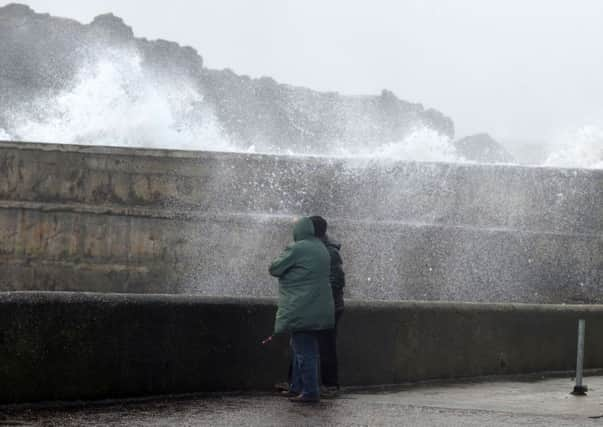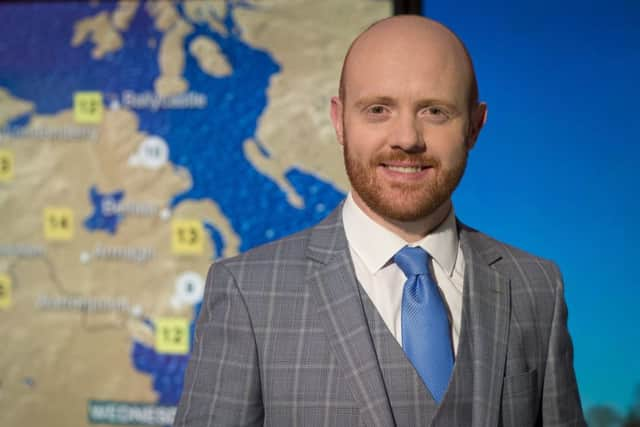Did the storm seem like a ‘Gareth’?


This week Gareth stormed its way across the UK and Northern Ireland with heavy rain and severe winds, causing travel disruption and dramatic scenes of crashing waves and buffeted pedestrians battling with rampant, frankly useless umbrellas.
Given the gale’s ferocity, many will contend the name ‘Gareth’ just doesn’t sound very, well, stormy; a gust with little gusto, a namby-pamby little storm in a teacup, as opposed to a big squally mess of a day... (apologies to all the Gareths out there).
Advertisement
Hide AdAdvertisement
Hide AdAt least Storm Ophelia, a name many will associate with the tragic heroine in Shakespeare’s Hamlet, evoked the drama of that particular deadly storm back in October 2017.


Another Shakespearian heroine, Juliet asked: ‘‘What’s in a name?” in Act II, Scene II of Romeo and Juliet. “That which we call a rose by any other name would smell as sweet,” she says – arguing that a name is merely a label, and a label does not change the essence of a thing.
It’s a lovely sentiment, but, of course, as any parent knows, choosing a name for their offspring is an agonising decision, often involving hours of frantic canvassing. Get it wrong and the poor child will be saddled for life with a daft name like Apple, Princess Tiaami, Buddy Bear. Dudley, even.
Applying a moniker to a storm makes us think of people with that name...which brings us back to Gareth.
Advertisement
Hide AdAdvertisement
Hide AdFor many, Gareth will conjure up an image of a gentle, innocuous soul. Someone who works in accounts, maybe. Or stationery.
It doesn’t really evoke the drama of what, after all, was a violent, tree-uprooting storm.
Last year we experienced a sequence of gent-storms and lady-storms - Ali, Bronagh, Callum, Deirdre, Erik, Freya.
Out of this lot, Deirdre, seems the most tempestuous, after all, for many of us the name will bring to mind Coronation Street’s big glasses-wearing, croaky-voiced Deirdre Barlow.
Advertisement
Hide AdAdvertisement
Hide AdDeirdre, as many will recall, was often in the midst of a stormy barney with her husband, the priggish, street intellectual Ken Barlow. And who could blame her?
After Gareth, these are the next names we should expect to storm through 2019: Hannah, Idris, Jane, Kevin, Lily, Max, Niamh, Oliver, Peggy, Ross, Saoirse, Tristan, Violet, Wyn.
Peggy, of course, evokes another soapland star, Peggy Mitchell, the brassy, battleaxe ex-landlady of the Queen Vic in Eastenders.
Peggy, seems an appropriate name for a potent weather system, a Lilliputian lady, who often morphed into a towering inferno of rage as she guldered “Gerrahtofmypub”. If anyone could kick up a storm, Peggy Mitchell could.
Advertisement
Hide AdAdvertisement
Hide AdBut Storm Kevin? Surely not! Kevin is a gentle sort who favours tank tops and alphabetising his record collection.
And Storm Tristan? A chinless hooray in tweed, rather than a ferocious weather flurry.
For years we managed to call storms ‘that bloomin wind and rain’, so who decided to start personifying them with human names?
The answer is the Met Office. In 2014 it followed the example of America and started giving storms with the potential to cause medium or high wind impacts, alternating male and female names.
Advertisement
Hide AdAdvertisement
Hide AdThe formulation was set up by the US National Hurricane Center in the 1970s.
The list does not include Q, U, X, Y and Z, to comply with international storm-naming conventions, so if you are called Quentin, Una, Xavier, Yvonne or Zachary, your moment of fame is, for the moment at least, on hold.
In September 2015 the Met Office started a special campaign called Name Our Storms, asking the public to send in their suggestions for names.
The most popular names put forward by the public through email, Facebook and Twitter, are made into a list, in alphabetical order, with other Irish names suggested by Met Éireann (Ireland’s equivalent of the Met Office).
Advertisement
Hide AdAdvertisement
Hide AdThe first windstorm to be named was Abigail on November 10, 2015.
The Met Office hoped that naming big storms will make people more aware of them and how dangerous they can be.
They think it will be easier to follow the progress of a storm on the TV, radio, or on social media, if it has a name. Derrick Ryall, from the Met Office, said: “We have seen how naming storms elsewhere in the world raises awareness of severe weather before it strikes.”
And according to polling, almost 80% of people think giving storms a name is useful in making them more aware of the severe weather.
Advertisement
Hide AdAdvertisement
Hide AdAdditionally, 63% believe it is useful in letting them know to take action.
BBC Northern Ireland weather presenter Barra Best also believes it’s a good idea.
‘‘The evidence from the likes of the Met Office and Met Eireann, who both work together to announce names every year, would suggest that it helps raise awareness of the potential dangers surrounding the storms.
‘‘When we look at social media when storms are named, quite quickly when they do begin to make an impact, they trend across social media and obviously that makes people more aware of what to expect and some of the dangers that can be associated with those storms as well.’’
Advertisement
Hide AdAdvertisement
Hide AdBarra added that whenever a storm is named, people tend to tag friends and family who share the name.
‘‘We see the details of those storms being put up on Facebook - a lot of people do tag in their friends and that in itself is helping to raise awareness that the storm is coming.
‘‘People may think it’s a bit of fun, but of course storms can be quite serious as well so anything to help people prepare for it - the travel disruption that could be expected with a storm - can only be seen as a good thing.’’
And would Barra like to see his name bestowed on a storm?
‘‘Well, I suppose that one’s up to the public,’’ he laughs, ‘‘You never know, it might be picked up in a few years’ time, but hopefully it will be a damp squib.’’
Advertisement
Hide AdAdvertisement
Hide AdSo, even though Hannah, Idris, Jane, Kevin, Lily, Max, Niamh, Oliver, Peggy, Ross, Saoirse, Tristan, Violet, Wyn, may sound like names on the register at a trendy north London primary school, as one comedian has suggested, being battered by high winds, incessant rain and the resulting floods, is definitely not amusing.
And, ironically, it seems that ever since the Met Office chose to give storms names, the weather appears to have become a lot worse. So if you are called any of the above, you probably won’t have long to wait until your own name comes up.
Of course, one good thing about this naming convention is that instead of shaking a futile fist at anonymous skies, we now know who to blame.
So for those of us who left the house without an umbrella this week and ended up getting soaked to the skin and having our hair-dos wrecked, we know whose fault it was. Gareth’s!